Andrew C. Stewart is a British freelance artist and illustrator that specializes in the space art, astronomy, science fiction and fantasy art.
Artist says: I am a freelance artist with experience in general graphics and advertising, including posters, video covers, book covers and technical drawing. My particular skills and passion are in high quality airbrush work. I have always been into astronomy, fantasy and science fiction. What I like about 'space art' is that one can go anywhere in the mind's eye; opening new doors to the visual imagination. Painting forces us to synthesis everything we know from science nature. Like many "space artists", I was influenced as a teenager by the old master of space art - Chesley Bonestell, the images that appeared in Astronomy Magazine and books like The Conquest of Space.
Below are some examples of Andrew C. Stewart's original space paintings with artist description.
Cosmic Art:
Note: All artwork and images copyright © Andrew C. Stewart. Please do not use images without the permission of the artist.

Jupiter Storm Systems. Acrylic on canvas (51 x 34 inches). The colossal weather systems and changing clouds of Jupiter, the planet, are massive. There are no mountains, valleys, volcanoes or rivers, and there is no boundary between land and air - just a vast ocean of dense gas and cloud Everything we see on Jupiter is floating in the sky.
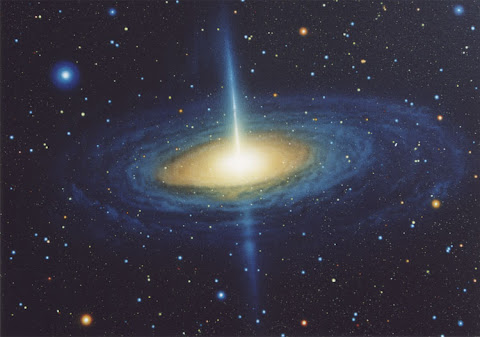
Black Hole. Acrylic on canvas (37 x 29 inches). The Galaxy is active; a huge central force made by a black hole sends out jets of matter from the galactic centre.

Super Nova. Acrylic on canvas (31 x 30 inches). The death of a Solar System; vaporisation of worlds when the local sun becomes a Supernova.
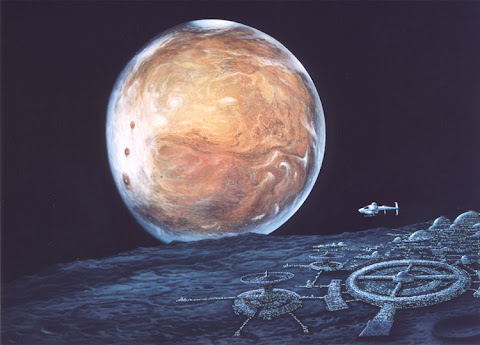
The Seeds of Mars. Acrylic on canvas (41 x 30 inches). Mars as seen from its larger moon, Phobos. Part of an international effort to prepare Mars for humans.
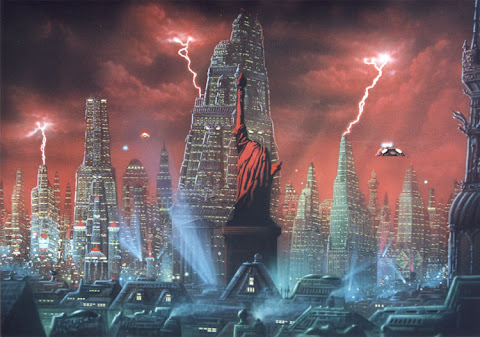
Green House Effect. Acrylic on canvas (41 x 30 inches). In only about 100 years big cities like New York will be totally obliterated because of smog and industrial pollution; chemical erosion like that in the atmosphere of Venus.

Compact Group of Galaxies. Acrylic on canvas (36 x 24 inches). The almost edge on spiral Galaxy shows subtle signs of disturbance, the dust lane is slightly askew and the fragile ends of the spiral arms have been fluffed up by interaction with its companion Galaxies.

Past & Future of Mars. Acrylic on canvas (60 x 30 inches). Mars might change if its surface were warmed by human effort. Rising temperatures would release the Carbon Dioxide and water currently frozen in the planet's polar caps; then Mars would terra-form into a mini Earth.

Deep Space. Acrylic on canvas (41 x 30 inches). A rich cluster of galaxies in Reticulum, known only by its catalogue name: CA0340-538.

Globular Cluster. Acrylic on canvas (37 x 36 inches). Inside the core of a giant globular Galaxy, billions of years ago, long before the Milky Way was formed. The core of the cluster is so crowded that these ancient stars sometimes interact, producing Pulsars.

Comet. Acrylic on canvas (33 x 31 inches). Comet - Hale Bopp shown here over Antarctica.

Jupiter Mission. Acrylic on canvas (31 x 21 inches). Jupiter and its moons seen from a giant space station.
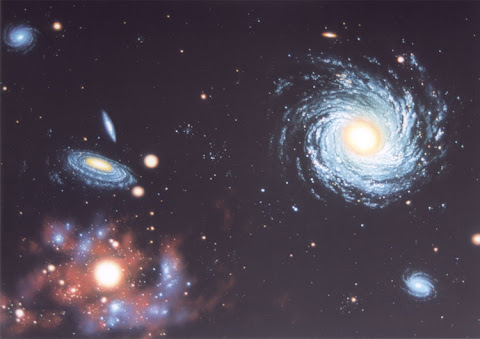
Spiral. Acrylic on canvas (40 x 22 inches). A rich cluster of Galaxies, giant elliptical Galaxy spiral and faint dwarfs. There are more of these distant Galaxies than there are stars in the Milky Way.
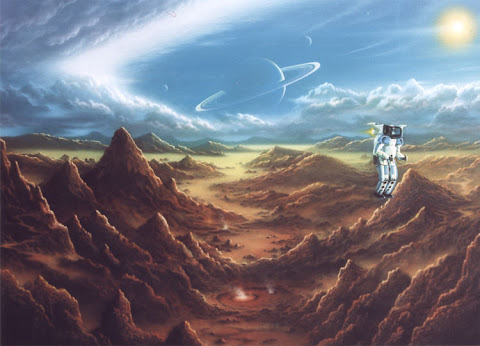
Moons of Saturn. Acrylic on canvas (47 x 40 inches). A robot probe descends through the upper clouds of Titan to the unknown surface below.
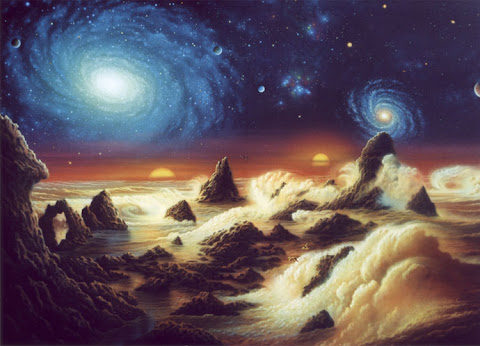
Unexplored. Acrylic on canvas (60 x 42 inches). Two spirals rising over an ocean of another world high above the Galactic plane.
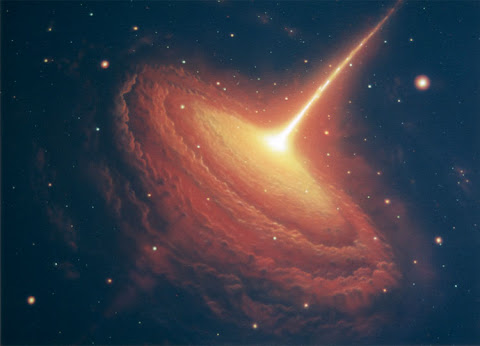
Black Hole and Quasar. Acrylic on canvas (41 x 30 inches). The so-called Accretion Disc glowing hotter as pieces of matter crash together, swirling very fast and huge jets of hot gas and matter are being shot into space.

Life and Death of Stars. Acrylic on canvas (41 x 30 inches). Inside a giant globular galaxy a compact starburst of a kind we no longer see, at least not nearby. They are of enormous interest to astronomers because of their age and their place in the evolutionary history of the galaxy.

The New Earth. Acrylic on canvas (41 x 30 inches). Early planet life transforms earth's atmosphere and volcanic landscape.

Red Giant. Acrylic on canvas (41 x 30 inches). The sun is slowly dying and engulfing the earth's atmosphere.

Life Bearing Moons. Acrylic on canvas (62 x 40 inches). Probes beneath the ice of Jovian moons in search for signs of life.

The Most Distant View. Acrylic on canvas (18 x 12 inches). The large foreground star is possibly meant to be a binary star partner to the star which collapsed to form the black hole.
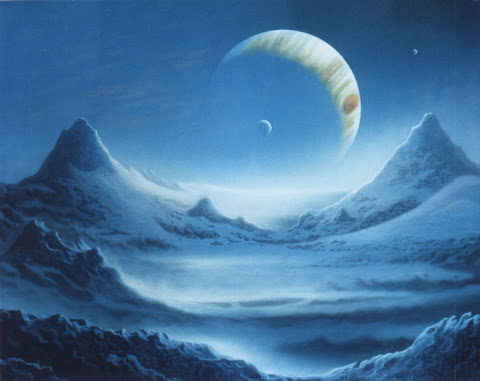
Europa's Surface. Acrylic on canvas (22 x 18 inches). The moon Europa discovered in 1610 by Galileo Galilei and barely smaller than Earth's moon but like no other body in the Solar System.

The Early Earth. Acrylic on canvas (32 x 20 inches). The early Earth at the time of the origin of life.

Jupiter System. Acrylic on canvas (40 x 24 inches). Jupiter is so large that it has its own mini solar systems. The view of Jupiter from one of the outer satellites.

Io the Volcanic Moon. Acrylic on canvas (62 x 40 inches). In this image streamers from the Prometheus Volcano can be seen spewing clouds of atoms such as oxygen and sulphur into the moons atmosphere.

The Mayflower Hotel. Acrylic on canvas (41 x 30 inches). Shuttles dock in the first stage of the creation of an international space hotel to prepare the future of the human race to travel into the solar system.

The Future of Apollo 17. Acrylic on canvas (22 x 18 inches). For the first time on any Apollo flight the Apollo 17 astronauts viewd a full Earth and moon as they began their lunar journey.

Mar's Canyons. Acrylic on canvas (22 x 18 inches). A view of the Valles Marineris Canyon System, over 2000 kilometers long and 3000 kilometers wide and up to 8 kilometers deep.

Dark Star. Digital image. As the sun evolves toward a red giant the Earth will become dry, barren and airless. Eventually the sun will fill most of the sky, and may engulf the planet.

Colonize. Acrylic on canvas (50 x 39 inches). The creation of a space city on the icy moon Europa. Some scientists even propose that there is a whole ocean of liquid water hiding beneath the moons icy crust.
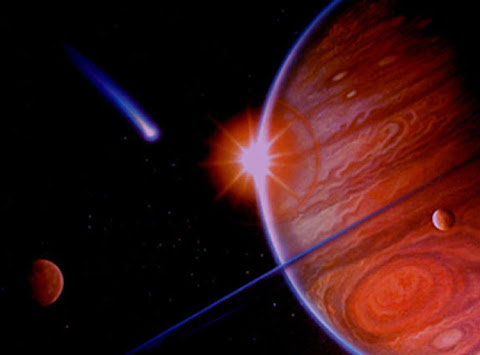
Collision. Acrylic on canvas (37 x 26 inches). Telescopes around the world focussed on Jupiter to watch the collision of comet Shoemaker-Levy with this vast planet.

Fire Bubble. Acrylic on canvas. In a contact binary, the Luminous stellar atmosphere flows from a red giant star to the accretion disk around a pulsar neutron star the disk glows in X-rays and other radiation at the point of contact.

Jovian Atmosphere. Acrylic on canvas (40 x 24 inches). Inside Jupiter's swirling atmosphere the bulk of the planet consists of hydrogen under such pressures that it has become liquid and metallic.

Globular Star System. Digital image. A hypothetical planet or moon in orbit about a distant member of a globular star cluster.
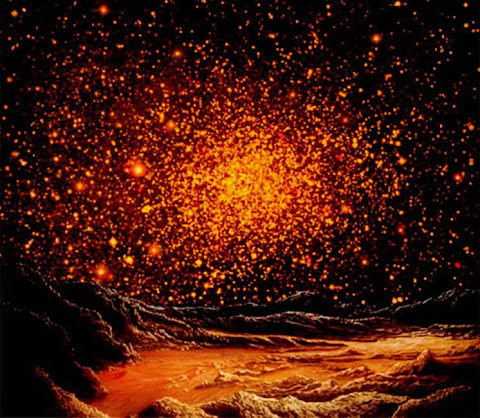
Old Galaxies. Digital image. A globular cluster of stars, orbiting the galactic core.

Saturn and its Moons. Digital image. Pioneer 11 image of Saturn and its moons after a voyage of more than five years.

UFO Sightings. Digital image. America's covert aircraft and alien technology. The recorded image appeared able to move across the sky at very high speeds, the probability factor that the term UFO might have been raised on more than one occasion.

Visitors from the Past. Acrylic on canvas (41 x 30). A number of crop circles appeared in West Yorkshire during summer 2000, including one near the old post office public house, near Barnsley, which was over 200ft in diameter.

Looking into the Future. Acrylic on canvas (51 x 34 inches). If mankind survives another 1000 years the human race will have great knowledge and power to make new worlds.

Life Bearing. Acrylic on canvas (37 x 36 inches). Over the next 20 years NASA envisions a series of increasingly powerful ground and space-based searches to locate life-bearing planets.
Website I: Andrew C. Stewart Space Art Gallery
Website II: Andrew C. Stewart Space Art Gallery








































0 Comments:
Post a Comment